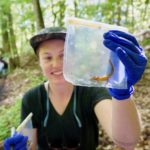The VandeWoude Laboratory studies a variety of agents that infect domestic and nondomestic cats, most predominantly Feline Immunodeficiency Virus.
The mission of the VandeWoude Lab is to:
- Train undergraduate, graduate, pre- and post-DVM students, and post-doctoral fellows in modern techniques in molecular virology, with emphasis on experimental design, data interpretation, and accurate and fluent reporting of results.
- Strive to continuously develop new methodologies to apply to the research process.
- Facilitate productive and collaborative interactions between SVRG lab members and collaborators both internal and external to CSU.
- Extrapolate findings to whole animal and population health, in vivo relevance, and community/ecological impacts.
- Challenge existing dogma with an open mind and thoughtful approach.
- Generate enthusiasm and appreciation for the impact of well-considered scientific approaches on human and animal health and well-being.
- Provide a supportive, lively, challenging, cooperative and fun environment for scientific investigations in complementary disciplines.
VandeWoude Lab Research Aims
research project
Feline Ecology: Landscapes, Infectious Disease, And Epidemics
There are many questions about the spread of disease in felines. The FELIDAE (Feline Ecology: Landscapes, Infectious Disease, And Epidemics) research project seeks to answer questions about disease spread in wild felids, with the aim of promoting conservation, and ultimately minimizing disease outbreaks in wildlife, domestic animals, and humans.
view project
research project
Feline Immunodeficiency Virus (FIV)
Cats infected with FIV, much like humans with HIV, suffer from oral disease. We are assessing how a novel combination antiretroviral therapy impacts infection, periodontal disease, and the cat's oral microbiome. This study is possible with the collaboration of microbiome experts, disease ecologists, veterinary dentists, veterinary immunologists and pathologists, and lab animal veterinarians.
research project
Microsporum Canis
M. canis is the primary pathogen in approximately 90% of Dermatophytosis cases in cats. Because the infection impacts the most adoptable (i.e. kittens), it can be a devastation in shelters. The infection can also be zoonotic and infects people worldwide. Our lab is currently investigating potential virulence genes in M. canis and developing a rapid point-of-care diagnostic for this agent.
research project
Diagnostics
The VandeWoude lab focuses on an array of pathogen testing through a variety of assays including conventional PCR, qPCR, ELISA, and multiplex bead based immunoassay. Current pathogens in our screening portfolio is feline foamy virus, feline gammaherpesvirus, feline immunodeficiency virus, puma and bobcat lentivirus, feline panleukopenia virus, and feline leukemia virus.
Publications
Seasonal changes in network connectivity and consequences for pathogen transmission in a solitary carnivore.
Gilbertson MLJ, Hart SN, VanderWaal K, Onorato D, Cunningham M, VandeWoude S, Craft ME. Sci Rep. 2023 Oct 18;13(1):17802. doi: 10.1038/s41598-023-44815-y.PMID: 37853051
Innovation, teamwork, and global awareness characterize Colorado State University DVM training.
Tucker C, VandeWoude S, Frye M.J Am Vet Med Assoc. 2023 Sep 1;261(9):1400. doi: 10.2460/javma.23.07.0378. PMID: 37607673
Subtilisin 3 production from Microsporum canis is independent of keratin substrate availability.
Moskaluk AE, Darlington L, VandeWoude S. J Basic Microbiol. 2023 Aug 8. doi: 10.1002/jobm.202300125. Online ahead of print. PMID: 37551993
Translational research at Colorado State University: capitalizing on collaboration.
Webb TL, VandeWoude S. Am J Vet Res. 2023 Aug 5;84(9):ajvr.23.07.0157. doi: 10.2460/ajvr.23.07.0157. PMID: 37527833
Role of Spillover and Spillback in SARS-CoV-2 Transmission and the Importance of One Health in Understanding the Dynamics of the COVID-19 Pandemic.
Sparrer MN, Hodges NF, Sherman T, VandeWoude S, Bosco-Lauth AM, Mayo CE.J Clin Microbiol. 2023 Apr 26:e0161022. doi: 10.1128/jcm.01610-22. Online ahead of print. PMID: 37098970
more publications
67
undergraduate and graduate students mentored
141+
manuscripts published in scientific journals since 2000
77
grants and awards
totaling over $24 million in funding
People
Sue VandeWoude, D.V.M.
Lab Principal Investigator [PI]
Dean, College of Veterinary Medicine & Biomedical Sciences
University Distinguished Professor
Michelle Galvan
Undergraduate Student Researcher
news and updates
view all
February 17, 2022
The Conversation: Deer, mink and hyenas have caught COVID-19 – animal virologists explain how to find the coronavirus in animals and why humans need to worry
How are so many animals catching the coronavirus? And what does this mean for human and animal health?
February 1, 2022
Hunting can change virus evolution, transmission in pumas
A new study published in Nature Ecology and Evolution offers rare insight into the pathway of a common virus in two geographic areas with different wildlife management strategies.
December 16, 2021
‘A promiscuous virus’: CSU experts discuss SARS-CoV-2, what comes next
Dr. Sue VandeWoude, a veterinary scientist and director of the One Health Institute at Colorado State University, described SARS-CoV-2, which causes COVID-19, as a “pretty promiscuous virus.”
contact information
Offices: Pathology room 211A & 228
Laboratory: Pathology room 207
(970) 491-7696
[email protected]









